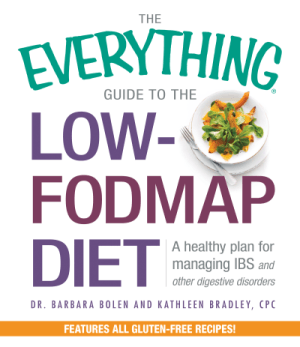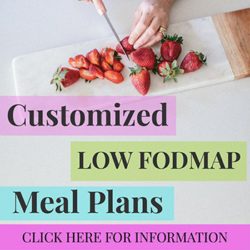Is the low-FODMAP diet too complicated for the average person?
The diet is complex, there is no doubt about that. For best success, a person should work with a dietary professional to ensure that all nutritional needs are being met. Also, it does take time to figure out what one can eat and what one shouldn’t eat. That said, once a person is on the diet for a week or so, they start to get the hang of it. They get into a routine, they develop a new set of comfort or go-to foods and find places where they know they can get FODMAP-friendly foods.
Some people find that some of the foods on the Allowed list are problematic. Why is that so?
The Allowed lists typically are comprised of foods that have been tested and found to be low in FODMAPs. However, every body is unique and it may be that certain foods trigger people for reasons other than their FODMAP content.
Why do some foods come up on the Restricted list on some lists and the Allowed list on others?
It is important to remember that not all foods have been specifically tested for their FODMAP content. Some lists contain foods that were characterized by “best guesses” at the time. The most up-to-date resource for the FODMAP content of food is Monash University, either through their website, their publications or their mobile app.
What about foods that do not show up on FODMAP food lists?
Keep in mind that FODMAPs are carbohydrates. Therefore, there are no FODMAPs in foods comprised of protein or fat. A person on the low-FODMAP diet can eat these foods freely. When in doubt about a food that does not show up on FODMAP food lists, one can make a guess based on the FODMAP content of similar foods.
Is the low-FODMAP diet safe for vegetarians and vegans?
The diet can be challenging for vegetarians and vegans due to the restriction of many legumes. The diet can be safely followed as long as there is a concerted effort to take in adequate protein. Lacto-ovo vegetarians can meet their protein needs through eggs, hard cheeses, and lactose-free milk products. For those who do not eat eggs and dairy products, low-FODMAP nuts, seeds, milk substitutes and grains can provide some protein. Tofu, tempeh and seitan (non-celiacs only) are also allowed in all phases of the diet. Last, small amounts of well-rinsed canned lentils and chick peas have been shown to be low-FODMAP. It is advisable that vegetarians and vegans work with a qualified dietary professional to ensure that they are consuming safe levels of protein.
Author Biographies
Dr. Barbara Bolen is a psychologist, health coach, and acclaimed health writer specializing in digestive health. She runs a private psychotherapy practice and health coaching business, and currently serves as the IBS Expert for the website About.com. She is the author of Breaking the Bonds of Irritable Bowel Syndrome and co-author of The Everything® Guide to the Low-FODMAP Diet
and IBS Chat: Real Life Stories and Solutions
. Her training and
experience in psychology, medical research, and nutrition provide her with a unique background for helping people to optimize their mental, digestive and overall health. Visit drbarbarabolen.com for more information about Dr. Bolen’s work.
Kathleen Bradley, CPC is a writer, consultant, recipe developer and certified professional coach. With over twenty years of award-winning business experience serving top magazine publishers—Condé Nast, Hearst Magazines, and Time Inc.,—her work has been featured in the pages of popular health and healthy cooking publications, including Cooking Light, Health and Self. Career media highlights include appearances on NBC’s Today in NY, CBS This Morning, ABC’s The View, as well as a number of television and radio network affiliates.
Diagnosed with IBS in 2011, Kathleen has studied the FODMAP diet extensively in an effort to ease her own symptoms. She has real-life experience in putting low-FODMAP recipes on the table. Kathleen’s first cookbook, The Everything® Guide to the Low-FODMAP Diet , presents 150 healthy and delicious original recipes for managing IBS and other digestive disorders. Visit KathleenBradley.net for more information about Kathleen’s work.




I wondered about the vegetarian thing. I was a vegetarian for a good portion of my life and can easily go without meat. I also think certain combinations of food can be okay while others can trigger things. I am not sure if the low FODMAP diet is based on simple ingredients or not, but I know the less there are, the healthier it is.
To be on a safe site, an IBS sufferer should try to prepare food from scratch as much as possible and limit the intake of processed food. I will soon start an experiment and for a whole month I am going to eat only natural, whole low FODMAP food.
Thanks for your information. I was just looking for some low fodmap recipes, this book seems exactly what I need.